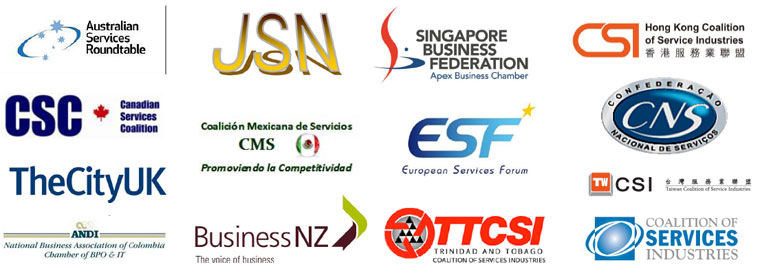The Global Services Coalition (GSC) speaks for the services sector in their respective countries on matters of international trade and investment and represents their industries internationally. Services, such as financial services, insurance, professional services, information and communications technology, express delivery and logistics, retail services, education services, electronic security services, and energy and environmental services, tourism and transport services lie at the heart of modern, competitive economies. We have a shared interest in the continuing liberalisation of trade and investment in services and in modernizing rules on services, which will benefit economic growth, job creation, and consumer choice.
The closing weeks of 2015 will see several significant opportunities for governments and their trade negotiators at the multilateral, plurilateral and regional levels to take major steps forward in delivering these potential benefits. Earlier this month twelve countries accounting for 40 percent of world trade concluded the Trans Pacific Partnership negotiations. On December 15-18 the Tenth WTO Ministerial Conference will be held in Nairobi. There will also be strong pressure to make progress with other interrelated negotiations of global significance: the Trade in Services Agreement (TiSA) negotiations, the EU-US Transatlantic Trade & Investment Partnership (TTIP), and the Japan-EU Economic Partnership Agreement (EPA). Together these initiatives will promote the progress of global trade as a whole and for trade and investment in services worldwide.
The GSC is deeply concerned about the WTO Nairobi Ministerial Conference’s prospects for success and for making progress in setting the global agenda for trade policymakers. Although the world has emerged from the critical phase of the financial crisis, full growth and recovery are not yet assured. The WTO has an important role to play in this recovery and must generate renewed momentum in the major tasks it has set itself to complete. Key among these is moving beyond the Doha Round agenda by adopting a realistic package of forward looking issues in Nairobi, taking account of ongoing substantive trade negotiations. The Global Services Coalition looks to the Nairobi Ministerial to achieve such an advance, along with accelerating the ratification of the WTO Trade Facilitation Agreement, finalizing the extension of the Information Technology Agreement (ITA), and realizing the potential of the GATS LDC Services Waiver. We urge the participants in the ongoing Environmental Goods Agreement to conclude it as soon as possible and to complement it with negotiations on services related to environmental products so as to maximize the efficiency of the tariff cuts.
But success at the multilateral level will not, by itself, be sufficient. There is also a pressing need to complete negotiations on TiSA, TTIP, and the Japan-EU EPA and to implement fully the TPP. All four represent interrelated negotiating objectives of the world’s largest markets and engender huge expectations in terms of strengthening global value chains and increasing trade, investment, jobs, and GDP. Together they have the potential to be a yardstick for guiding future trade and investment policy in such key matters as market-opening, national treatment of trade and investment, fair and transparent domestic practices, facilitation of cross border data flows, disciplines on state-owned enterprises, and regulatory cooperation. The GSC urges all the governments involved in these negotiations to conclude them with the high-level and ambitious commitments to market opening that are so badly needed to kick start new economic growth and to serve as the basis for new agreements which include broader economies.
The Global Services Coalition appreciates the opportunities provided to date by governments for consultation with services industries worldwide. We call on negotiators to continue to provide regular information on the progress of trade negotiations affecting services.
The Global Services Coalition will continue to monitor key trade and investment negotiations closely and to work actively to build support for these negotiations and their implementation in our respective countries.
